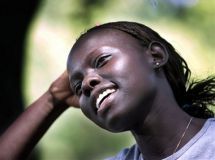A Sudanese ‘lost child’ to become US citizen
July 3, 2006 (BOSTON) — At the age of 3, Aduei Riak (pronounced Ahd’-way Ree’-ak) began traveling across Africa, going from country to country looking for refuge from the civil war that had erupted in her homeland the year before she was born.
 On Tuesday, 19 years after she fled the Sudan, Riak will be sworn in as a U.S. citizen during an Independence Day ceremony in Boston.
On Tuesday, 19 years after she fled the Sudan, Riak will be sworn in as a U.S. citizen during an Independence Day ceremony in Boston.
To Riak, becoming a U.S. citizen is the fulfillment of a long dream to find a country to call home.
“The United States has been so great to me in many, many ways. It has given me a chance of a lifetime that no other country has given me, not even my birth country,” said Riak, now 22 and a student at Brandeis University.
“It is my home,” she said.
Since 1995, more than 22,000 refugees from Sudan have arrived in the United States. The refugees must wait a year before they can apply for their green card for legal residency and five years before they can apply for citizenship. Immigration officials say Riak is among the first wave of the “lost children of the Sudan” who are becoming U.S. citizens.
Riak first fled the Sudan in 1987, along with her mother and five siblings, when the civil war led to a mass exodus. For the next several years, her family lived in a refugee camp in Ethiopia, until they were separated and forced out during a political uprising there.
Then 8, Riak began walking with a huge crowd of people, mostly children. Most were orphans or didn’t know where their parents were.
Riak said she didn’t know where she was going, but was just told to keep walking. In searing heat, across desert and remote terrain, thousands and thousands of people walked. For three months, they walked 18 to 20 hours a day, Riak said.
“It was a flock of children and a few adults. You sort of just joined the stream of people, and the stream became a river, and the river became rivers of people,” she said.
They ate whatever they could find, mostly wild berries. They had water only when it rained. Other times, they had to drink urine to survive, Riak said.
The group walked to Kenya, where they finally found some respite in the Kakuma refugee camp.
Riak stayed in the camp until she was 16, when she was told she was going to the United States as part of a resettlement program.
“I was excited. I thought, finally, I will go to school. I will begin my life,” she said.
Lutheran Social Services in Boston arranged her resettlement in the Boston area. Over the next few years, she lived with three foster families in Belmont, where she attended high school.
In 2003, at the age of 19, she went to live with a family in Needham. Helen Peters and Garrett Parker had two grown children of their own, and decided to take in Riak after spending Christmas Day with her in 2002.
Peters and Parker got Riak into a pre-college program at Brandeis University. This fall, she’ll start her senior year at Brandeis, where she is majoring in anthropology, and international and global studies.
“She’s very kind, very gentle and very concerned about other people,” said Peters. “She finds it hard to even kill a mosquito because life is so precious to her.”
Peters and Parker will be on hand Tuesday, when Riak takes the oath of citizenship along with more than 20 others during a ceremony at the Hatch Shell on the Charles River Esplanade, the site of Boston’s annual July Fourth celebration.
For Riak, it will be a sweet moment.
One of the things she is most looking forward to, she said, is voting for the first time in her life.
“Before I could only discuss issues, but I couldn’t really feel a part of it. Now, I can vote, and the sky’s the limit,” she said.
Riak said the current anti-immigration sentiment in the United States makes her sad.
“My understanding of U.S. history is that this country was founded by immigrants,” she said. “If we are going to close the doors, I think we are going against the basis of this nation, what it was founded on.”
Riak learned several years ago that both her parents are alive. She will see them for the first time in 17 years when she returns to Africa this summer for a two-month oral history research project on the refugee camp in Kenya.
As a U.S. citizen, Riak could eventually sponsor her parents for citizenship as well. It’s something she plans to talk with them about, she said.
“There is an abundance of opportunity in the United States that you cannot find anywhere else,” she said.
(ST/AP)
